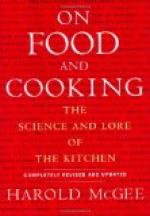“Porcelain ware” is iron lined with a hard, smooth enamel, and makes safe and very desirable cooking utensils. German porcelain ware is unexcelled for culinary purposes.
“Granite ware” is a material quite recently come into use, the composition of which is a secret, although pronounced by eminent chemists to be free from all injurious qualities. Utensils made from it are light in weight, easily kept clean, and for most cooking purposes, are far superior to those made from any other material.
What is termed “galvanized iron” is unsuitable for cooking utensils, it being simply sheet iron coated with zinc, an exceedingly unsafe metal to be used for cooking purposes.
Tin, which is simply thin sheet iron coated with tin by dipping several times into vats of the melted metal, is largely employed in the manufacture of cooking utensils. Tinware is acted upon by acids, and when used for holding or cooking any acid foods, like sour milk, sour fruits, tomatoes, etc., harmful substances are liable to be formed, varying in quantity and harmfulness with the nature of the acid contained in the food.
In these days of fraud and adulteration, nearly all the cheaper grades of tinware contain a greater or less amount of lead in their composition, which owing to its greater abundance and less price, is used as an adulterant of tin. Lead is also used in the solder with which the parts of tinware are united. The action of acids upon lead form very poisonous compounds, and all lead-adulterated utensils should be wholly discarded for cooking purposes.
Test for Lead-Adulterated Tin.—Place upon the metal a small drop of nitric acid, spreading it to the size of a dime, dry with gentle heat, apply a drop of water, then add a small crystal of iodide of potash. If lead is present, a yellowish color will be seen very soon after the addition of the iodide. Lead glazing, which is frequently employed on crockery and ironware in the manufacture of cooking utensils, may also be detected in the same manner.
Cooking utensils made of copper are not to be recommended from the point of healthfulness, although many cooks esteem them because copper is a better conductor of heat than iron or tin. The acids of many fruits combine with copper to form extremely poisonous substances. Fatty substances, as well as salt and sugar, act upon copper to a greater or less degree, also vegetables containing sulfur in their composition and produce harmful compounds.
Utensils made of brass, which is a compound of copper and zinc, are not safe to use for cooking purposes.
TABLE TOPICS.
Bad cooking diminishes happiness
and shortens life.—Wisdom of
Ages.
Says Mrs. Partington:
“Many a fair home has been desiccated by poor
cooking, and a man’s
table has been the rock on which his happiness
has split.”




